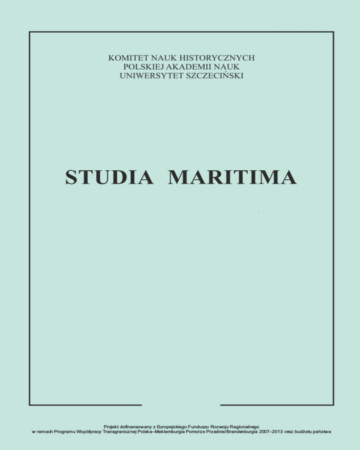






| Authors: |
Patrycja
Jakóbczyk-Adamczyk
Instytut Polityki Międzynarodowej i Bezpieczeństwa, Uniwersytet Jana Kochanowskiego w Kielcach |
| Keywords: | principle of freedom of the seas Fernando Vázquez de Menchaca ius gentium Hugo Grotius |
| Whole issue publication date: | 2017 |
| Page range: | 16 (5-20) |
| 1. | Aunós y Pérez, Eduardo. El Renacimiento y problemas de derecho internacional que suscita. Madrid: Imprenta de Raul Péant, 1917. |
| 2. | Barcía Trelles, Camilo. Francisco de Vitoria. Fundador del Derecho Internacional moderno. Valladolid: Universidad de Valladolid, 1928. |
| 3. | Brown Scott, James. El descubrimiento de América y su influjo en el derecho internacional. Madrid: Tipografía de Archivos, 1930. |
| 4. | Brown Scott, James. El origen español del derecho internacional moderno. Valladolid: Talleres Tipográficos Cuesta, 1928. |
| 5. | Carpintero Benítez, Francisco. Del derecho natural medieval al derecho natural moderno: Fernando Vázquez de Menchaca. Salamanca: Universidad, 1977. |
| 6. | Egío, Victor. La pieza que no encaja: reseña crítica a la „Controversias ilustres y de su uso frequente” de Fernando Vázquez de Menchaca. Dostęp 16.08.2014. http://www.saavedrafajardo.org/Archivos/NOTAS/RES0109.pdf. |
| 7. | Fernández Prida, Joaquín. Estudios de derecho internacional público y privado. Madrid: Librería General de V. Suárez, 1901. |
| 8. | García Arias, Luis. Historia del principio de la libertad de los mares. Santiago: E.U.C., 1948. |
| 9. | Grotius, Hugo. O prawie wojny i pokoju. Trzy księgi o prawie wojny i pokoju, w których znajdują wyjaśnienie prawo natury i prawo narodów a także główne zasady prawa publicznego. Tłum. Remigiusz Bierzanek. Warszawa: Państwowe Wydawnictwo Naukowe, 1957. |
| 10. | Grotius, Hugo. Wolność mórz czyli dysertacja o prawie jakie przysługuje Holendrom do handlu z Indiami z dodatkiem, który zawiera wyjątki z dzieła Grotiusa „O prawie wojny i pokoju” oraz z rozprawy Jana Seldena „O morzu zamkniętym”. Tłum. Remigiusz Bierzanek. Warszawa: Państwowe Wydawnictwo Naukowe, 1955. |
| 11. | Hamilton, Bernice. Political Thought in Sixteenth-Century Spain: A Study of the Political Ideas of Vitoria, de Soto, Suarez and Molina. Oxford: Clarendon Press, 1963. |
| 12. | Jakóbczyk-Adamczyk, Patrycja. „Fernando Vázquez de Menchaca i jego myśl polityczna”. W: Dziedzictwo Andrzeja Frycza Modrzewskiego w myśli humanistycznej i politycznej, red. Jerzy Kukulski, 178–197. Toruń: Adam Marszałek, 2004. |
| 13. | Medina y Sobrado, Pedro Gabriel de. Aporte de Fernando Vázquez de Menchaca a la escuela Española de Derecho Internacional. La Habana: Editorial L. Ruiz, 1946. |
| 14. | Miaja de la Muela, Adolfo. Internacionalistas españoles del siglo XVI. Fernando Vázquez de Menchaca (1512–1569). Madrid: Talleres Tipográficos Cuesta, 1932. |
| 15. | Pagden, Anthony. Lords of the World: Ideologies of Empire in Spain, Britain and France, c. 1500– c. 1800. New Haven: Yale University Press, 1995. |
| 16. | Parker, Thomas M. „The Papacy, Catholic Reform, and Christian Missions”. W: The New Cambridge Modern History, t. III: The Counter-Reformation and Price Revolution, 1559–1610, red. Richard Bruce Wernham, 44–71. Cambridge: Cambridge University Press, 1968. |
| 17. | Rodríguez Alcalde, Fidel, „Prólogo”. W: Vázquez de Menchaca, Fernando. Controversiarum illustrium aliarumque usu frequentium libri tres. I–XXIII. Valladolid: Talleres Tipogr. Cuesta, 1931. |
| 18. | Santaló Rodríguez de Viguri, José Luis. „Don Fernando Vázquez de Menchaca. Nuevos datos para su biografía”. Anuario de la Asociación Francisco de Vitoria 17 (1969/1970): 13–35. |
| 19. | Seelmann, Kurt. Die Lehre des Fernando Vazquez de Menchaca vom Dominium. Köln: Heymann, 1979. |
| 20. | Skinner, Quentin. The Foundation of Modern Political Thought, t. II: Age of Reformation. Cambridge: Cambridge University Press, 1978. |
| 21. | Tokarczyk, Roman. Klasycy praw natury. Lublin: Wydawnictwo Lubelskie, 1988. |
| 22. | Vazquii Menchacensis, Fernandi. Controversiarum illustrium aliarumque usu frequentium libri tres. Venetiis: Zalterus, 1595. |